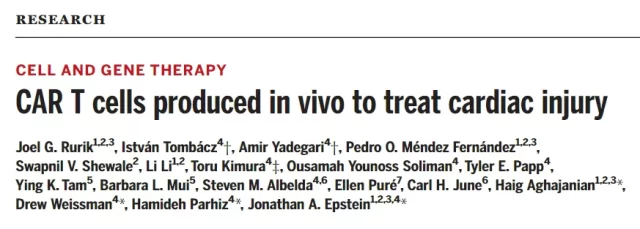mRNA Technology treats Fractures and Bone Defects and Promoting Bone Regeneration
- Normal Liver Cells Found to Promote Cancer Metastasis to the Liver
- Nearly 80% Complete Remission: Breakthrough in ADC Anti-Tumor Treatment
- Vaccination Against Common Diseases May Prevent Dementia!
- New Alzheimer’s Disease (AD) Diagnosis and Staging Criteria
- Breakthrough in Alzheimer’s Disease: New Nasal Spray Halts Cognitive Decline by Targeting Toxic Protein
- Can the Tap Water at the Paris Olympics be Drunk Directly?
mRNA Technology treats Fractures and Bone Defects and Promoting Bone Regeneration
- Should China be held legally responsible for the US’s $18 trillion COVID losses?
- CT Radiation Exposure Linked to Blood Cancer in Children and Adolescents
- FDA has mandated a top-level black box warning for all marketed CAR-T therapies
- Can people with high blood pressure eat peanuts?
- What is the difference between dopamine and dobutamine?
- How long can the patient live after heart stent surgery?
mRNA Technology treats Fractures and Bone Defects and Promoting Bone Regeneration
In addition to being used in infectious disease vaccines, mRNA , as a platform technology, has a broad application space. mRNA technology leaders Moderna and BioNTech have already started related research on mRNA cancer vaccines.
Recently, researchers from the Mayo Clinic in the United States published a research paper entitled: Efficient healing of large osseous segmental defects using optimized chemically modified messenger RNA encoding BMP-2 in the journal Science Advances .
This study shows that the use of chemically modified mRNA encoding the BMP-2 protein can induce bone regeneration to repair segmental defects in long bones . This provides an innovative, safe and highly translatable technique for bone healing.

Segmental bone defects do not heal well and remain a major clinical problem that can lead to amputations, and regenerative medicine offers new hope for restoring and regenerating solid bone.
BMP-2 is a natural protein in the body that promotes the development of bone and cartilage.
As early as 2002, the FDA approved Medtronic ‘s implants based on recombinant human BMP-2 protein as bone graft materials. But in fact the product is expensive, and the efficacy and side effects are not ideal.
The Mayo team believes that encoding BMP-2 protein through mRNA may be a potential way to promote bone regeneration.
Human bone regenerates in two ways: directly from mesenchymal progenitor cells to form osteocytes , or through endochondral ossification , where cartilage is first formed and then transformed into bone.
Recombinant BMP-2 protein therapy utilizes the former approach, while mRNA therapy utilizes the latter approach.
The research team carried out experiments in a rat bone defect model. The chemically modified mRNA (cmRNA) encoding BMP-2 was delivered through a lipid carrier and injected at the truncation site of the femur.
The mRNA was able to continuously produce BMP-2 protein in situ with almost no Escape to other tissues and organs.
On day 5 post-injection, protein expression decayed to low levels. In contrast, the clinically equivalent dose of recombinant human BMP-2 protein began to taper off after reaching a high point on the first day.

The experimental results showed that the missing bones of the rats in the 50 microgram treatment group had all bridged and healed at the 4th week, and the regenerated bones showed mechanical properties comparable to those of natural bones, which were significantly better than those of the treatment group using recombinant BMP-2 protein. .
The team said that mRNA was chosen over DNA because mRNA can be delivered via non-viral vectors, which are cheaper.
And mRNA does not integrate into the human genome and only exists in the body for a short period of time, so it is safer.
The success of the mRNA COVID-19 vaccine has encouraged scientists around the world to explore the application of mRNA in other fields .
Just on January 6 this year, researchers at the Perelman School of Medicine at the University of Pennsylvania published a paper in Science .
The research team developed a transient engineered CAR-T cell therapy generated in vivo by injecting mRNA delivered by lipid nanoparticles ( LNPs ) to reprogram T cells to recognize cardiac fibrotic cells, thereby reducing fibrosis, Restoration of cardiac function in a mouse model of heart failure.
This method is similar to an mRNA vaccine. It only takes one injection to generate CAR-T cell therapy in the body, which is expected to solve the current problems of complex process, long cycle and high price of CAR-T therapy .

Overall, this study by the Mayo team shows that in bone healing, mRNA technology promises better results, lower prices, and better safety than traditional gene therapy or recombinant protein approaches. Has potential for clinical application.
Reference:
https://www.science.org/doi/10.1126/sciadv.abl6242
https://www.science.org/doi/10.1126/science.abm0594
mRNA Technology treats Fractures and Bone Defects and Promoting Bone Regeneration
(source:internet, reference only)
Disclaimer of medicaltrend.org
Important Note: The information provided is for informational purposes only and should not be considered as medical advice.



